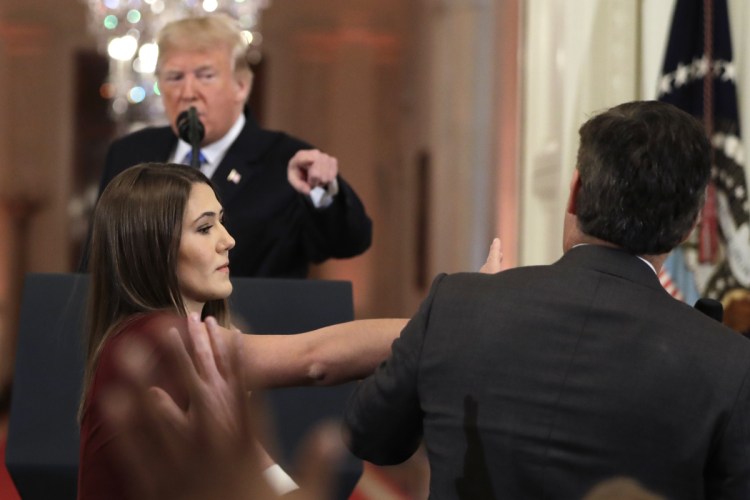CNN sued the Trump administration on behalf of reporter Jim Acosta on Tuesday, asking a court to restore Acosta’s White House press pass after President Trump suspended it last week.
The unusual suit, an escalation of Trump’s long-running war of words with CNN, seeks a judge’s intervention after Trump banished Acosta from the White House grounds for an indefinite period after a brief altercation between Acosta and a White House press aide.
After a testy exchange between the president and the reporter, the unidentified press aide went up to Acosta to take a microphone out of his hands. As a result, press secretary Sarah Sanders announced a few hours later that the White House had revoked Acosta’s “hard pass,” which enables reporters to enter and leave the grounds each day.
CNN filed suit in U.S. District Court in Washington. “We have asked this court for an immediate restraining order requiring the pass be returned to Jim, and will seek permanent relief as part of this process,” the network said in a statement released Tuesday morning.
Legal experts say the network’s chances of winning in court are favorable. The First Amendment protects journalists against arbitrary restrictions by government officials.
“I think it’s a really strong lawsuit,” Floyd Abrams, a noted First Amendment lawyer, told CNN on Sunday. “I think (CNN) should sue, and if it’s not about Acosta, this is going to happen again … So whether it’s CNN suing or the next company suing, someone’s going to have to bring a lawsuit, and whoever does is going to win” unless the White House can show that Acosta is violent and disruptive.
Disputes have occasionally flared over which members of the press corps are qualified to receive a “hard pass.” But Trump’s action appears to be unprecedented; there’s no record of a president revoking such a pass from a reporter because he didn’t like the questions the reporter asked.
During Lyndon Johnson’s presidency, the Secret Service denied a credential to reporter Robert Sherrill of the Nation magazine. The agency said Sherrill, who had been in a fistfight with one of Johnson’s campaign aides, was a physical threat to the president. Sherrill sued and won in 1977, though he declined to apply for a pass afterward, according to journalist George Condon.
Another possible parallel: A federal judge last year struck down Trump’s blocking of critics on Twitter. She ruled that the First Amendment prevented him from denying access to presidential statements due to a would-be follower’s opinions and views.
The same principle applies in the Acosta case, said Jameel Jaffer, executive director of the Knight First Amendment Institute at Columbia University, which brought the Twitter suit last year.
“The government cannot exclude reporters from [the White House] because of their views,” said Jaffer. “Once the government created a general right of access it cannot selectively withdraw it based on viewpoint. Viewpoint is not a criterion that establishes a media organization’s right to be at a news briefing.”
CNN’s lawsuit, he added, “is critical to preserve the media’s ability to ask hard questions and hold the government accountable … It would be intolerable to let this kind of thing go unchallenged. Other reporters would end up hesitating before asking sharp questions, the White House would be able to use the threat of similar revocations for critical coverage and media coverage of the White House would be distorted because of fear of official retaliation.”
Journalists have been widely supportive of Acosta since Trump pushed him out last week. In a statement Tuesday, the White House Correspondents Association’s president, Olivier Knox, said the organization “strongly supports” CNN in regaining its access. He said the revocation of Acosta’s credential was a “disproportionate reaction” to the press conference incident. “The president of the United States should not be in the business of arbitrarily picking the men and women who cover him,” Knox said.
Others have urged even stronger action in response to Trump’s retaliation against Acosta.
Richard Toffel, the president of Pro Publica, the nonprofit investigative news organization, suggested in an interview that journalists band together and walk out of the White House press room.
“If favorable coverage is the price of operating with the [White House] gates, then we can cover it from outside the gates,” said Toffel, a lawyer who was once an intern in the White House press office. “I think that as a matter of press freedom, the press corps in the room should say, ‘If you’ve redefined the rules to hand out passes only to those whose coverage you don’t object to, we’re all leaving.’ This isn’t principally a legal question. It’s a question of editorial independence.”
Copy the Story Link
Send questions/comments to the editors.



Success. Please wait for the page to reload. If the page does not reload within 5 seconds, please refresh the page.
Enter your email and password to access comments.
Hi, to comment on stories you must . This profile is in addition to your subscription and website login.
Already have a commenting profile? .
Invalid username/password.
Please check your email to confirm and complete your registration.
Only subscribers are eligible to post comments. Please subscribe or login first for digital access. Here’s why.
Use the form below to reset your password. When you've submitted your account email, we will send an email with a reset code.